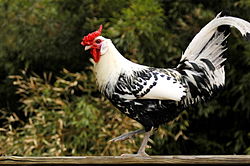This is a list of chicken breeds usually considered to be of German origin. [1] [2] Some may have complex or obscure histories, so inclusion here does not necessarily imply that a breed is predominantly or exclusively from Germany.
| Name in German | English name if used | Notes | Image |
|---|---|---|---|
| Annaberger Haubenstrupphuhn | |||
| Augsburger | standard and bantam |  | |
| Bergische Kräher | standard and bantam |  | |
| Bergische Schlotterkamm | standard and bantam |  | |
| Bielefelder Kennhuhn | standard and bantam |  | |
| Deutscher Sperber | standard and bantam |  | |
| Deutsches Lachshuhn | standard and bantam |  | |
| Deutsches Langschan | German Langshan | standard and bantam |  |
| Deutsches Reichshuhn | standard and bantam |  | |
| Deutscher Sperber | standard and bantam |  | |
| Deutsches Zwerghuhn | true bantam |  | |
| Dresdner | standard and bantam |   | |
| Frankfurter Zwerghuhn | bantam | ||
| Hamburger | Hamburg or Hamburgh | standard and bantam |  |
| Italiener | German Leghorn | standard and bantam with single or rose comb |  |
| Kaulhuhn | standard and bantam |  | |
| Kraienkopp | standard and bantam |  | |
| Krüper | standard and bantam |  | |
| Lakenfelder Huhn | Lakenvelder | standard and bantam |  |
| Niederrheiner | standard and bantam |  | |
| Ostfriesische Möwe | standard and bantam |  | |
| Pfälzer Kämpfer | |||
| Phönix | Phoenix | standard and bantam |  |
| Ramelsloher |  | ||
| Rheinländer | standard and bantam | ||
| Ruhlaer Zwerg-Kaulhuhn | bantam | ||
| Sachsenhuhn | standard and bantam |  | |
| Strupphuhn | Frizzle | standard and bantam | |
| Sundheimer | standard and bantam |  | |
| Thüringer Barthuhn | standard and bantam |  | |
| Tuzo [3] | . | true bantam | |
| Vogtländer | |||
| Vorwerkhuhn | Vorwerk | standard and bantam |  |
| Westfälische Totleger |  | ||
| Winsener Masthuhn | |||
| Yokohama | standard and bantam |  | |